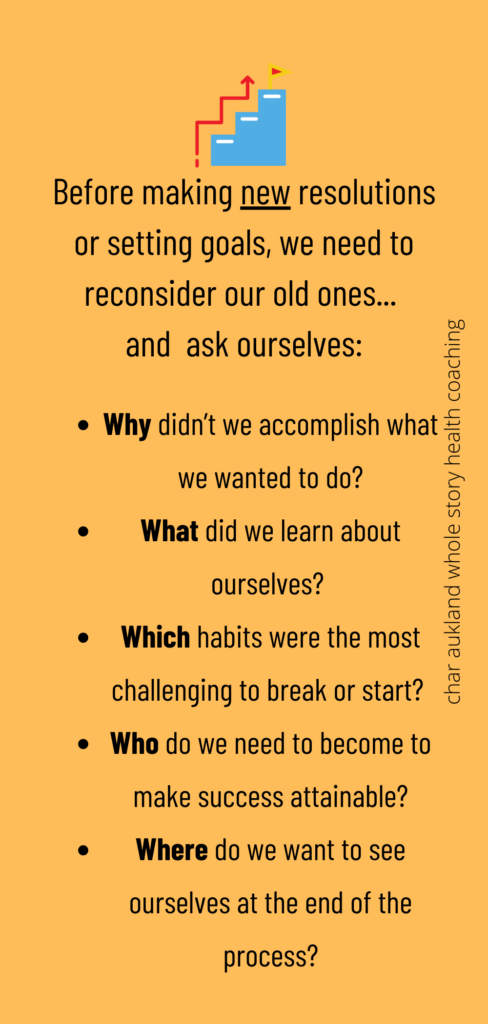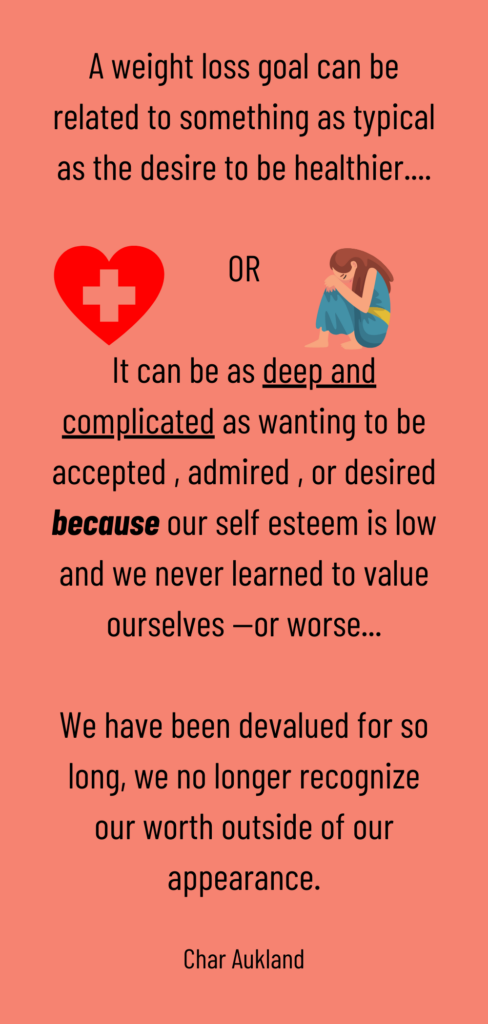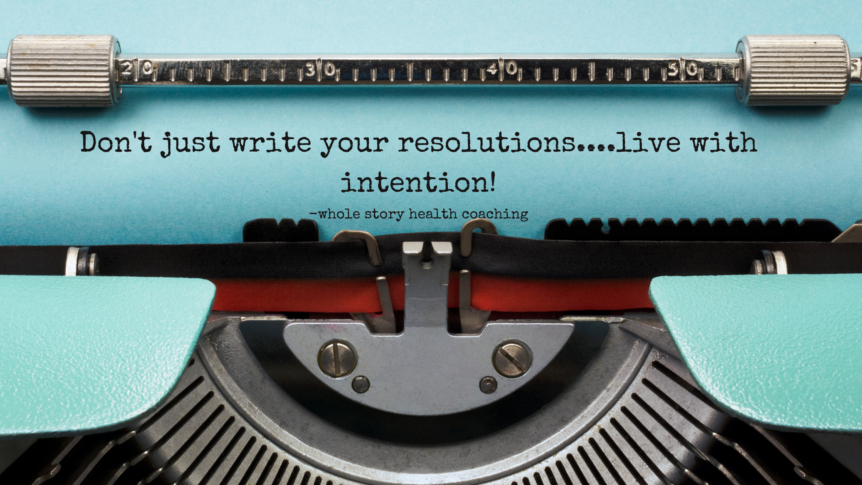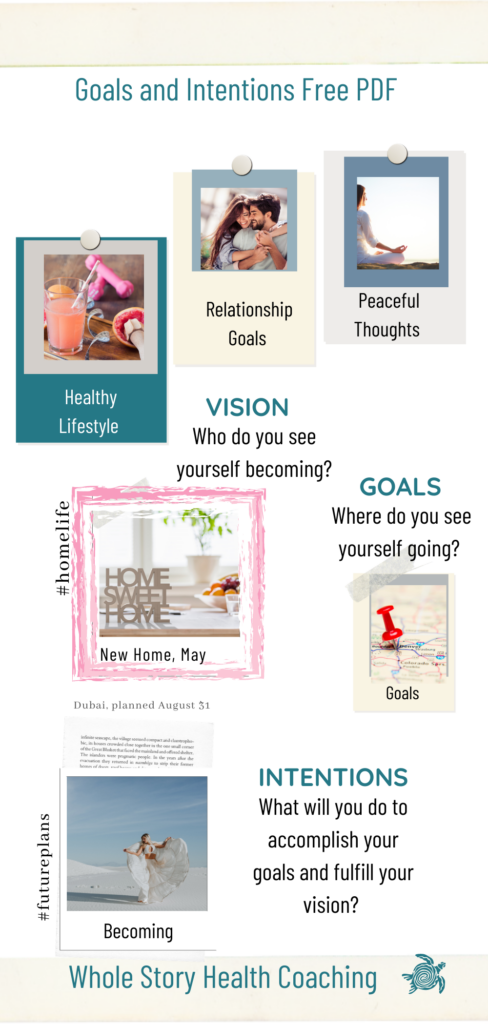No matter the time of year , a fresh start feels like a new lease on life. Being eager for change makes making resolutions seem like a logical step to take. But…resolutions don’t work —unless you do!
Unfortunately our goals tend to remain just goals because we haven’t learned lessons from the previous years.
The “unlearned lessons” obstacle makes new resolutions hard to accomplish.
This lack of awareness prevents us from recognizing:
- what really needs to change
- the behaviors and habits that have kept us held back
- how to make lifestyle changes that will last
Planning for Success
Though people enjoy making resolutions, they don’t fulfill them because their goals are more along the lines of hopes to be better…instead concrete plans for actual lifestyle adjustments.
To successfully accomplish our goals, we need actionable plans to support our well-intentioned hopes — and to help prevent us from quitting on ourselves—before we really get started.
For those reasons, we have to learn to focus on what we intend to do and how we intend to do it.
- Consider your unfulfilled resolutions from the previous year
- Let your goals and values guide you.
- Define the purpose of your goals.
- Set daily intentions.
- Brainstorm actions to support your intentions.
1. Consider your unfulfilled resolutions from the previous year.
With that knowledge in mind, reflect on your goals and what normally stops you from achieving them. We often start each year with excitement and motivation, using the momentum to power our way through the first couple of months. After that, life kicks in— and for many of us, our old habits come back stronger than ever.
Before making resolutions or setting goals, we need to take a step back and consider our previously unfulfilled goals and resolutions—taking the time to ask ourselves:
- Why didn’t we accomplish what we wanted to do?
- What went well and what did we learn?
- Which habits were the most challenging to break or start?
- Who do we need to become to make success attainable?
- Where do we want to see ourselves at the end of the process?
Tip: Going through these questions and understanding the answers will help you avoid potential roadblocks or figure out ways around them…You also gain a better idea of what fits your personality and lifestyle.

2. Let your goals and values guide you.
Keeping our eyes fixed on our goals can help us to redirect ourselves when we veer off track. By pairing our goals with the values we want to live by, we create a foundation to establish our success on.
For example, one of my values is peace— and my goal is to create peaceful inner and outer environments for myself.
To do this, I have to be aware of what disturbs my peace, and how to cope when that happens.
Since I know that the news and clutter are two major offenders, I take daily steps to make choices like:
- avoiding the news
- deleting certain posts
- staying out of news related discussions
- decluttering and donating
- cleaning
- organizing
Each of these actions are ways that I intentionally live my values, while fulfilling my goal of peace.
Tip: Throughout the day, we can do periodic checks to make sure that our thoughts, choices, and habits are in alignment with the person we want to become.
3. Define the purpose of your goals.
On the surface, a goal may sound simple. But in life, things are rarely what they seem.
For instance, while a weight loss goal can be related to something as typical as the desire to be healthier, it can also be as deep and complicated as wanting to be accepted , admired , or desired because our self esteem is low and we never learned to value ourselves —or worse, we have been devalued for so long, we no longer recognize our worth outside of our appearance.
Each of us has our own reasons for the values we have and the goals we make. But unless we take an honest look at what is driving our behavior, we will never be able to steer ourselves to a place that is in our best interest.
Tip: Sit with this step. Be vulnerable and honest with yourself. So often we set goals without truly exploring our motivations. Take some time, journal your thoughts, and gain a better understanding of your “why” behind your goals.
4. Set daily intentions.
Simply put, our intentions are the things that we intend to do. Because so many of us live on autopilot and have become blind to many of our habits, leaving our comfort zones and living intentionally requires quite a bit of initial effort.
To become intentional, we have to learn to actually pay attention to what we are doing and why we’re doing it.
During my weight loss journey, becoming intentional showed me just how much and how often I was eating. I had no idea. As an emotional and a boredom eater, I did a lot of mindless snacking.
And, since we kept food on the counter, I would walk by and just pop something into my mouth— without giving it a second thought.
My other habits were along the same lines. Mindlessly scrolling social media, constantly checking my phone, or bingeing entire seasons of Netflix shows were all a part of my normal routine.
Being on autopilot felt easier than having to actually put thought and effort into my days.
Tip: My first few experiences with being intentional started with me writing out my intentions for the next day. Journaling them made it much more likely that I would accomplish what I set out to do. And when I didn’t, it showed. Find what works best for you…It may be journaling, phone reminders, or even accountability partners or groups.Experiment and pay attention.
5. Brainstorm actions to support your intentions.
Once we know what we want to intentionally do, the next step is to figure out how to do it—which is not always as easy as it is to say.
When approaching this step, think of:
- new habits you want to do
- what you don’t want to keep doing
- how you want to respond
- ways you don’t want to react
- obstacles that pose a challenge to who you want to become
After you have a better understanding of what you need to do, it makes figuring out how to approach it a lot easier.
For example, a few years ago I struggled with anxiety. Before I knew it, my thoughts would be in a spiral. The new habits I wanted to create were becoming more mindful and learning how to stop myself from losing control of my thoughts.
I didn’t want to just spend my days overthinking, stressed, and anxious. I wanted to respond to people and life’s circumstances in calm, rational ways … instead of constantly overreacting.
As you can see, all of that was a challenge to the peaceful person I wanted to become.
One of the first things I did was identify what contributed to my stress and anxiety. Next, I removed them whenever it was possible —this included people.
The hardest part was forming new response habits. That step required self-help books, a lot of prayer and working with a therapist.
Tip: Your tactics are yours. They are about what you need in the accomplishment of your goals. Ideally, writing them out and how they support your intentions is a key factor in becoming mindful enough to move to a better you.

Keeping Resolutions
One important way to reach our goals and achieve our resolutions is to remain aware of where we are. Below are some check-ins that would be helpful in making sure you stay on track.
- Monthly resolution check
- Weekly goal check
- Daily intentions check
Download the free worksheets to help guide your progress.
Note that intentions can apply to any area of your life: weight loss, relationships, friendships, career, home… Think about the areas that are your top priorities.
And remember….resolutions don’t work —unless you do!



